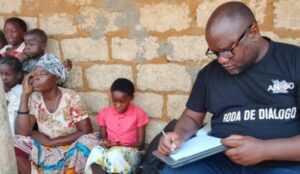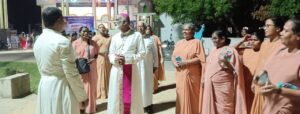By Sr. Julia Mary, Unit Link Communicator, Nepal (Province of Central East India Nepal)
Kranti’s (not her real name) life is a powerful testament to resilience and the power of support. After enduring 15 years of hardship and trauma, she found protection at Opportunity Village Nepal (OVN), where she was given the chance to heal and rebuild her life. Referred to OVN in 2022 by the One Stop Crisis Management Center (OCMC) of Patan Hospital in Lalitpur, Nepal, her journey toward a new beginning was filled with challenges but also with unwavering determination.
Background
Born in Modi Rural Municipality, Parbat, into a family struggling with extreme poverty, Kranti’s childhood was cut short. At the age of 12, she was sent to Kathmandu to work for a wealthy household, taking on responsibilities far beyond her years. The harsh treatment and unbearable working conditions soon became too much to endure forcing her to run away.
Alone and vulnerable, she encountered a man who offered her shelter and the promise of an education. Trusting him, she stayed with his family, calling him “uncle” while working in exchange for schooling. But over time, she became a victim of sexual abuse. At first, she didn’t fully understand what was happening, but as realization dawned, she was consumed by guilt and despair. Overwhelmed, she attempted to harm herself, believing there was no escape from her suffering.
By sheer fate, she was saved by an unknown person. That moment became a turning point in her life. Gathering courage, she confided in her teacher, who informed the school principal. Realizing the severity of her situation, the principal connected her with an organization that facilitated her rescue through the police. Eventually, she was referred to OVN for protection and care.
Intervention
At OVN, Kranti was given a safe space to heal. Psychosocial counselling helped her process her trauma, regain self-esteem, and develop emotional resilience. Legal aid played a crucial role in helping her understand her rights and navigate the legal process.
Although the case against her abuser had already been filed before she joined OVN, the hearings took place during her time at the safe home. With OVN’s support, she received legal guidance and knowledge, empowering her throughout the proceedings. Eventually, the case concluded with her abuser’s imprisonment, bringing her a sense of justice and closure.
Medical care addressed both her physical and mental health needs. In this secure environment, she began to rebuild her confidence and sense of self. Recognizing her desire for independence, OVN enrolled her in a three-month professional job training program at Life Project for Youth (LP4Y), where she developed essential employment skills. She later joined a residential industrial training program, equipping her with specialized expertise that would help her secure a stable future.
Challenges
One of the biggest challenges in Kranti’s journey was the lack of valid citizenship documents, which restricted her access to employment and essential services. Her birth certificate contained fabricated details, making it difficult to trace her true identity. To resolve this, OVN conducted extensive inquiries using both institutional and personal networks.
When investigations into the false documents led nowhere, the team worked closely with Kranti to piece together fragments of her childhood memories. Their efforts led to the identification of the man who had initially brought her to Kathmandu. Years earlier, he had filed a police report when she ran away, and his information provided a crucial link to her true origins in Parbat district.
Reintegration and Family Reunification
With her identity confirmed, OVN coordinated with local authorities in Parbat to begin the process of securing her citizenship. But what awaited her in her hometown was both heart-breaking and life-changing.
In January, the OVN team travelled with Kranti to Parbat, where they witnessed the dire conditions of her family. Her father had passed away, and her mother – now blind and deaf – and sister were struggling to survive in a temporary shelter on land that wasn’t even theirs. A landslide had destroyed their home, leaving them in extreme poverty. The family had searched for Kranti for years, never giving up hope of finding her.
On January 27, 2025, in the presence of local leaders, politicians, and child rights officers, Kranti was finally embraced by her mother and reunited with her sister. Tears of joy flowed as they held onto each other, overwhelmed by the reality of being together again after 15 long years. The reunion was an emotional moment beyond words.
Local authorities committed to supporting the family and assisting with the formalities of preparing Kranti’s citizenship documents. After spending some time with her family, she plans to return to Kathmandu to complete her training in tailoring and continue working toward an independent future.
A powerful reminder
Kranti’s journey is a powerful reminder of the importance of holistic interventions in empowering survivors of exploitation. Through counselling, legal aid, skill development, and dedicated advocacy, she has been able to reclaim her life. With her citizenship secured and a clear path forward, she is now ready to embrace a future filled with dignity, opportunity, and hope.
Her story stands as an ideal of resilience, demonstrating the life-changing impact of support, determination, and the will to rise above adversity.






